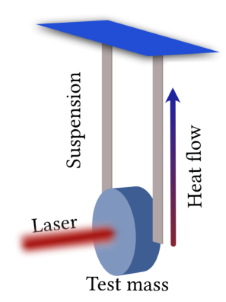Low-frequency mechanical oscillators under temperature gradients

Thermal excitations play one of the most significant roles in most physical systems: from quantum computers to gravitational-wave (GW) detectors. Many experiments use cryogenic technology to suppress the influence of thermal environment. Future gravitational-wave detectors will also operate at cryogenic temperatures. The need for extracting heat of the test masses will lead to thermal gradients in the test masses and their suspensions. These suspensions isolate the test masses from seismic motion and play crucial role in achieving high sensitivity to low-frequency signals. However, currently there exists no commonly accepted physical models of how these suspensions behave under thermal gradients. These heat flows might lead to the excess thermal noise, changes in the mechanical properties of the suspension, and even some non-linear effects. The exact behaviour is not known and requires detailed experimental as well as theoretical study.
In this project we aim to gain first insights into non-equilibrium behaviour of high-quality low-frequency mechanical oscillators. We interferometrically read out the motion of the seismically isolated suspended mirror, apply heat gradients to the suspension and study the changes in its frequency and quality factor. This will allow to gain first insights into constructing the new model for non-equilibrium states of macroscopic mechanical oscillators and open the door for future studies of the design of cryogenic mechanical sensors.




